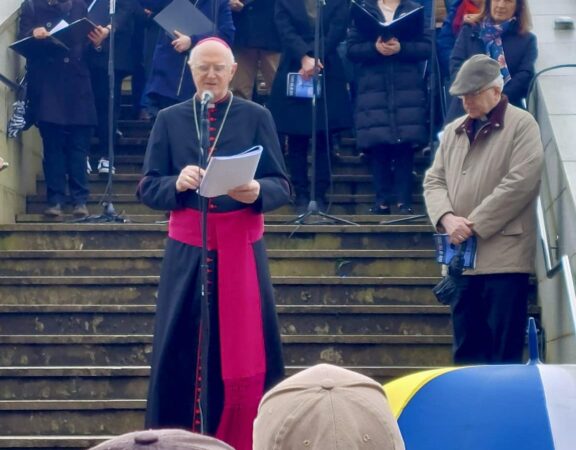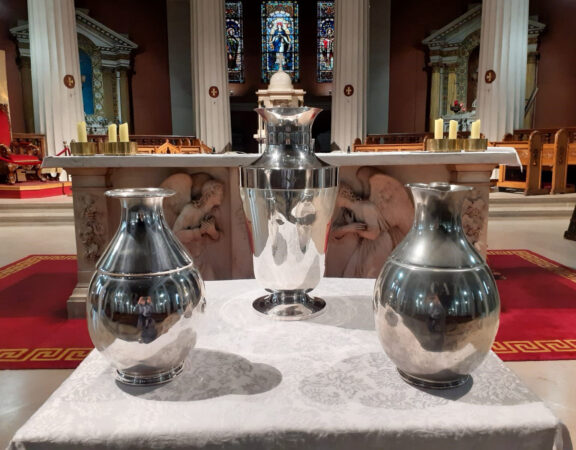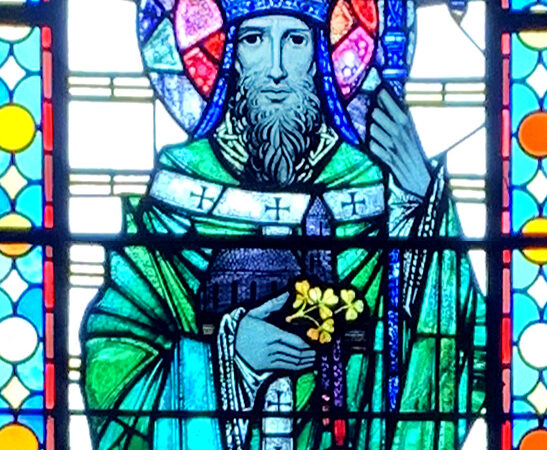MASS ON THE OCCASION OF ONE HUNDRED YEARS OF BACKLANE HOSTEL
Homily Notes of
Most Rev. Diarmuid Martin
Archbishop of Dublin
———————-
Back Lane Hostel, Dublin, 9th May 2015
My mother’s family lived for generations in New Row, just a few hundred yards from here and I myself was born in the Old Coombe Hospital and was baptised in Francis Street. This is an area of Dublin then that I knew very well as a child and the Night Shelter in Back Lane was a place that was clearly on my map, not that I would have really known what took place inside the red brick building I passed daily.
I knew that this was a place where homeless men could come for the night. We called it the night shelter. But for my mother anything that the Vincent DePaul did was good with honours and whatever happened in the hostel was obviously to be considered the fruit of good Christian care the less fortunate.
You were kind enough to send me proof copies of the short history which you have prepared for this centenary Mass and I must say that I was completely taken by much of its message. We are in the midst of all sorts of celebrations and centenaries, as we approach the centenary of 2016 and then almost a decade of celebration reflecting on the founding of the Irish State and the consolidation of its institutions.
Your centenary goes back to 1915 and to a situation of poverty and homelessness in a city, which was at the same time a prosperous city of business and commerce and culture. The statistics about homelessness at that time ring a note that is very familiar to us today. The number of the homeless was high, compared to the smaller population of the time. Your booklet is striking in showing that the political ups and downs of the time, the glorious moments which we will rightly commemorate in the coming years, were also marked by a sharp rise in homelessness. The uprising, the civil war, the slow economic growth of the new Irish State, was accompanied by increased homelessness almost unbeknown to the city. It is sad to see how even at a time of intellectual,political and nationalistic ferment, the Dublin of that time had a harsh parallel experience of burgeoning poverty and homelessness. I hope that in the celebrations of the anniversaries there might be some effort at looking also at the social history of the time and the harsh conditions in which so many people were living. It is striking to note that in the years between 1916 and 1925 the number of free meals distributed in Backlane rose from 20,000 to over 70,000!
My predecessor Archbishop William Walsh was aware of the changes and he placed great trust in the Society of Saint Vincent de Paul. He had founded the Catholic Boys Home in Abbey Street a little earlier, (a sign of the fact that there were many children and teenagers sleeping rough at the time) assigning the management to the Society. The Hostel in Back Lane developed some years later as a response the challenge of poor men who were homeless to an increasing degree and for a variety of reasons.
The Hostel was sustained by public generosity fostered in special gatherings at the Mansion House where the great and the good and ordinary citizens gave generously so that the work could continue.
I was stuck by the sudden spike in numbers in 1926, when we would have imagined that the new State would have been able to begin to put in place a strong social policy. That is striking enough, but even more striking is that, as you report: “there were more people sleeping rough in Dublin last winter than in the street count taken in November 1925”.
Today we are faced with a growing housing crisis which, despite attempts to coordinate emergency response, is not getting better. Credit must be given to government and to housing agencies for their work especially in the emergency response at the beginning of this year. But there is no way we can say that the response to homelessness in Dublin is simply on track. The facts say something different.
Just think of the effects of the probability of a serious ramping up of house repossessions. During the upcoming tourist, many hotels currently used to house the homeless will no longer be valuable. All of this indicates that in the coming months existing services will experience enormous strain and many of those entering homelessness will be children. Conscience, public opinion and political commitment must be kept alert every day. The problem is complex and cannot be resolved overnight, but we can never settle back into thinking we have done enough or that the emergency is over. It is not.
We celebrate this anniversary still in the liturgical season of Easter. It is the season in which we celebrate the new life that comes with the resurrection of Jesus Christ. Celebrating resurrection is not however just a liturgical event. In that wonderful first reading from the Acts of the Apostles we have a great description of the early Christian community and thus of the Church. “The whole group of believers was united, heart and soul and no one claimed for his own use anything he had, as everything that they owned was held in common”.
What was the root of this radical commitment of the first Christians? Were the Christians a sort of sect who lived on the margins of society? No: the basis of their vison, we heard in the reading, was that “they continued to testify to the resurrection of the Lord Jesus with great power”.
The Christian message of resurrection is not simply a cherished personal spiritual idea. It is something that must change individual Christian believers and change the community of believers. Resurrection is not just about a promise of future eternal happiness; it is about the meaning of life today. Resurrection means new life and fullness of life. The new life of Jesus is for us a path to fullness of life which then must burst out into a life of sharing. Sharing means not just giving something of what we possess: it is about striving to see that every man woman and child in our community can live their life to the fullness, just as we can. We are called to foster a sharing of opportunity and hope.
Backlane has been an important institution in this city now for one hundred years. Like myself many knew and know of the building, but this is more than a building. It is a hostel set on a quiet corner near one of the busiest traffic intersections in the city. Most people see the building and pass by. In one sense that might seem a negative judgement, but there is another side to that story. Backlane is a place where solitary and lonely and wounded men are received quietly, with human warmth rather than with publicity. It is a place where men who know real hardship and harshness in their lives, come and experience a tenderness they may not have known for years, a tenderness which helps them to re-discover themselves. It is a place where men receive not just food and a shower and a blanket and a bed, but above all a place where they re-find their dignity.
The name Saint Vincent de Paul is as byword for men and women who identify and reach out to the poor. We thank God for all those men and women inspired by Vincent de Paul over the past 100 year and still today who have respond to the needs of the homeless in our city and who contribute to the proud history of Backlane Hostel. ends









